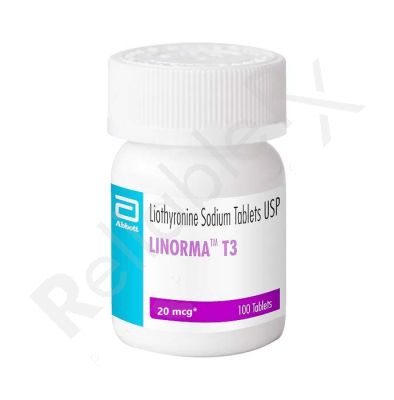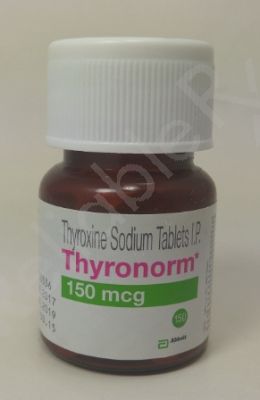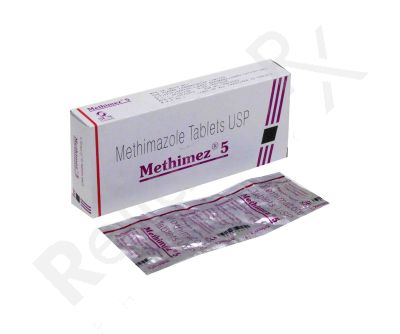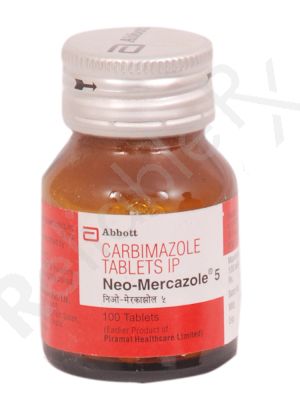-
 Linorma T3 20 mcgUS$ 0.56 - US$ 0.70
Linorma T3 20 mcgUS$ 0.56 - US$ 0.70US$ 0.56
Generic For : Cytomel T3Active Ingredients : Liothyronine100 Tablet/sUS$ 70.00 -
 Thyronorm 75mcgUS$ 0.10 - US$ 0.17
Thyronorm 75mcgUS$ 0.10 - US$ 0.17US$ 0.10
Generic For : SynthroidActive Ingredients : Bimatoprost Ophthalmic Solution120 Tablet/sUS$ 20.00 -
 Thyronorm 150mcgUS$ 0.10 - US$ 0.17
Thyronorm 150mcgUS$ 0.10 - US$ 0.17US$ 0.10
Generic For : SynthroidActive Ingredients : Bimatoprost Ophthalmic Solution120 Tablet/sUS$ 20.00 -
 Eltroxin 100 mcgUS$ 0.10
Eltroxin 100 mcgUS$ 0.10US$ 0.10
Generic For : SynthroidActive Ingredients : Thyroxine sodium120 Tablet/sUS$ 11.43 -
 Thyronorm 50 mcgUS$ 0.11 - US$ 0.16
Thyronorm 50 mcgUS$ 0.11 - US$ 0.16US$ 0.11
Generic For : SynthroidActive Ingredients : Thyroxine sodium120 Tablet/sUS$ 18.90 -
 Thyronorm 25 mcgUS$ 0.08
Thyronorm 25 mcgUS$ 0.08US$ 0.08
Generic For : SynthroidActive Ingredients : Thyroxine sodium120 Tablet/sUS$ 9.60 -
 Methimez 5mgUS$ 0.21
Methimez 5mgUS$ 0.21US$ 0.21
Generic For : TapazoleActive Ingredients : Methimazole30 Tablet/sUS$ 6.26 -
 Neomercazole 5mgUS$ 0.10 - US$ 0.14
Neomercazole 5mgUS$ 0.10 - US$ 0.14US$ 0.10
Generic For : NeomercazoleActive Ingredients : Carbimazole100 Tablet/sUS$ 14.00 -
 Tiromel 25 mcgUS$ 0.10 - US$ 0.14Generic For : Cytomel T3Active Ingredients : L-triidotironin SodiumSold Out
Tiromel 25 mcgUS$ 0.10 - US$ 0.14Generic For : Cytomel T3Active Ingredients : L-triidotironin SodiumSold Out
Hypothyroidism results from low levels of thyroid hormones. Many disorders give rise to hypothyroidism, which may directly or indirectly impact the thyroid gland. Thyroid hormones are believed to affect not only growth and development but also many cellular processes in the body. An inadequate amount of thyroid hormone can cause various complications in the body.
Hypothyroidism (also called underactive thyroid) can make you feel tired, gain weight, and may cause you a hard time tolerating cold temperatures. The primary treatment for hypothyroidism is hormonal replacement therapy (HRT).
About hypothyroidism
Hypothyroidism is a condition that develops when there is an insufficient amount of thyroid hormone in your body. This slows down the metabolism.
When does hypothyroidism develop?
Hypothyroidism occurs when the thyroid doesn’t produce enough thyroid in your body. A condition of having low levels of thyroid hormones is called myxedema. The symptoms of this serious condition include anaemia, low body temperature, coma, and confusion. This is a serious type of hypothyroidism and a life-threatening condition. Generally, hypothyroidism is treatable and can easily be controlled with regular medications and doctor consultations.
Working mechanism of thyroid
A thyroid gland is a small, butterfly-shaped organ in the front of your neck under the larynx (voice box). Its main function is to control your metabolism (a process your body uses to convert food to energy that your body utilizes to perform various functions). Your thyroid gland produces two types of hormones, T4 and T3, that help to control your metabolism. These hormones throughout the body inform the body’s cells how much energy to use and control your body’s temperature and heart rate. When your thyroid functions well, it constantly makes hormones and then makes new hormones to replace what’s been used. This allows your metabolism to work correctly and keeps all your body’s systems in check.
The thyroid hormone level in the blood is controlled by the pituitary gland, which is in the center of the bone structure of the head below the brain. When the pituitary gland identifies an excessive amount or a lack of thyroid hormone, it adjusts the hormone and sends it to the thyroid to balance the amounts.
Too high thyroid hormone levels are known as hyperthyroidism, while too low are hypothyroidism. In both cases, the entire body is impacted.
Who can get hypothyroidism
Hypothyroidism can affect anyone, regardless of age, gender, and ethnicity. It is commonly reported in women over 60 years of age. Generally, women are more likely to get hypothyroidism after menopause than in their earlier life.
Difference between hypothyroidism and hyperthyroidism
In hypothyroidism, the thyroid gland produces very little levels of thyroid hormones. Those having hyperthyroidism have a thyroid that makes an excessive amount of thyroid hormone. High levels of thyroid hormones (hyperthyroidism) speed up your metabolism. While in cases of hypothyroidism, metabolism slows down.
A lot of things are opposite between these two thyroid conditions. People suffering from hypothyroidism may find trouble tolerating colds. Those with hyperthyroidism may not be able to tolerate heat. Thus, these two are opposite thyroid conditions. Ideally, it is best to be in the middle. The goal of the treatment for both these thyroid conditions is to get your thyroid gland to function well in the middle ground as possible.
Causes of hypothyroidism
Hypothyroidism is categorized as having primary and secondary causes. A primary cause involves conditions that directly impact the thyroid, causing it to produce too few thyroid hormones. A secondary cause involves the failure of the pituitary gland, which means it cannot send thyroid-stimulating hormone (TSH) to the thyroid gland to achieve a balanced amount of thyroid hormones.
Primary causes are more common. The most common is Hashimoto’s disease (an autoimmune disorder). The condition is also termed Hashimoto’s thyroiditis or chronic lymphocytic thyroiditis. This condition is a hereditary disorder. In this disease, the body’s immune system attacks and damages the thyroid gland, preventing the thyroid from producing enough thyroid hormones. Some other primary causes of hypothyroidism include inflammation of the thyroid, treatment of hyperthyroidism (radiation or surgical removal of the thyroid), iodine deficiency, and hereditary conditions (a disease that is passed down through your family).
Sometimes, thyroiditis can occur after the baby’s delivery or a viral condition.
Effect of hypothyroidism on pregnancy
Pregnant women with hypothyroidism may feel tired, have trouble fighting cold temperatures and experience muscle cramps. Thyroid hormones play a crucial role in fetal development. This helps to develop the brain and nervous system of the baby. Therefore, balancing thyroid hormone levels during pregnancy is extremely important, especially when you have hypothyroidism. If the unborn baby does not get enough of these hormones, there may be problems associated with brain development, and also, there could be issues later.
Symptoms of hypothyroidism
The symptoms usually develop slowly over time. These can include tiredness, weight gain, depression, constipation, numbness/tingling in hands, inability to tolerate cold temperatures, dry skin/hair, high blood cholesterol, and decreased sexual interest.
Treatment
In most cases, hypothyroidism is treated by replacing the hormone your thyroid is no longer producing. Usually, oral medication is used to fulfill this purpose. Levothyroxine (also known as Thyroxine Sodium) is one of the most common medications used to treat hypothyroidism. It increases the thyroid hormone your body produces, thus improving levels.
Hypothyroidism can become a serious and life-threatening condition if not treated correctly. If you are not treated, your symptoms can become severe, including trouble breathing, developing mental health issues, heart problems, and enlargement of the thyroid gland (goiter).
What is the treatment for hypothyroidism?
Hypothyroidism treatment includes oral thyroid hormone medicine and levothyroxine, which must be taken daily. It balances thyroid hormone levels and eliminates symptoms of hypothyroidism.
What are the problems with thyroid medicines?
Side effects of thyroid medicine include nervousness, fatigue, headache, tremors, increased sweating, mood swings, and palpitations.
What are the long-term effects of hypothyroidism medications?
The long-term effects of thyroid medicines include decreased bone mineral density, joint pain, sensitivity to heat, weight fluctuations, autoimmune dysfunction, and changes to your menstrual cycle.
What to expect when taking hypothyroidism?
You should begin to feel better just after a few days of starting the treatment. But it may take a few months for your thyroid hormone levels to get back to normal range. If your levels improve, but you still experience symptoms such as weight gain and fatigue, your doctor may need to change your medicine.
Does hypothyroidism require lifelong treatment?
In most cases, hypothyroidism is a permanent problem requiring lifelong treatment.
What is the natural alternative to thyroid medicine?
If thyroid medicine causes side effects, natural remedies may be an alternative to opt for. This may include a selenium-rich, gluten-free diet, vitamin B supplements, and probiotics.
Can hypothyroidism be cured?
In general, hypothyroidism is a treatable condition. It can be managed with regular medicine and regular checkups.
Is hypothyroidism a serious disorder?
Rarely, severely untreated hypothyroidism may lead to myxedema coma, an extreme form of hypothyroidism in which body function slows down, resulting in life-threatening problems.
What is the best medicine for hypothyroidism?
Levothyroxine is considered the first-line treatment for hypothyroidism. It works well and doesn’t cause too many side effects.
How can I get thyroid medicine without seeing a doctor?
You can receive an online prescription for your thyroid medicine without being physically present in front of the doctor. Hypothyroidism does not require a physical exam for medicine to be prescribed.
Can I purchase thyroid medicine online?
Once you get the prescription for a particular thyroid medicine, you can order from an authentic online platform that offers genuine drugs at affordable rates.





20% OFF
On New Registration
Terms and Conditions Apply*
Flat 20% OFF
on your first purchase
20% off only on the product value
Maximum discount value $20
Only one coupon can be used at a time
Coupon code will be mailed on
your registered email address.
Login
Sign up
Flat 20% OFF
on your first purchase
20% off only on the product value
Maximum discount value $20
Only one coupon can be used at a time
Coupon code will be mailed on
your registered email address.
Login
Sign Up
Flat 20% OFF
on your first purchase
20% off only on the product value
Maximum discount value $20
Only one coupon can be used at a time
Coupon code will be mailed on
your registered email address.
Forgot Password ?